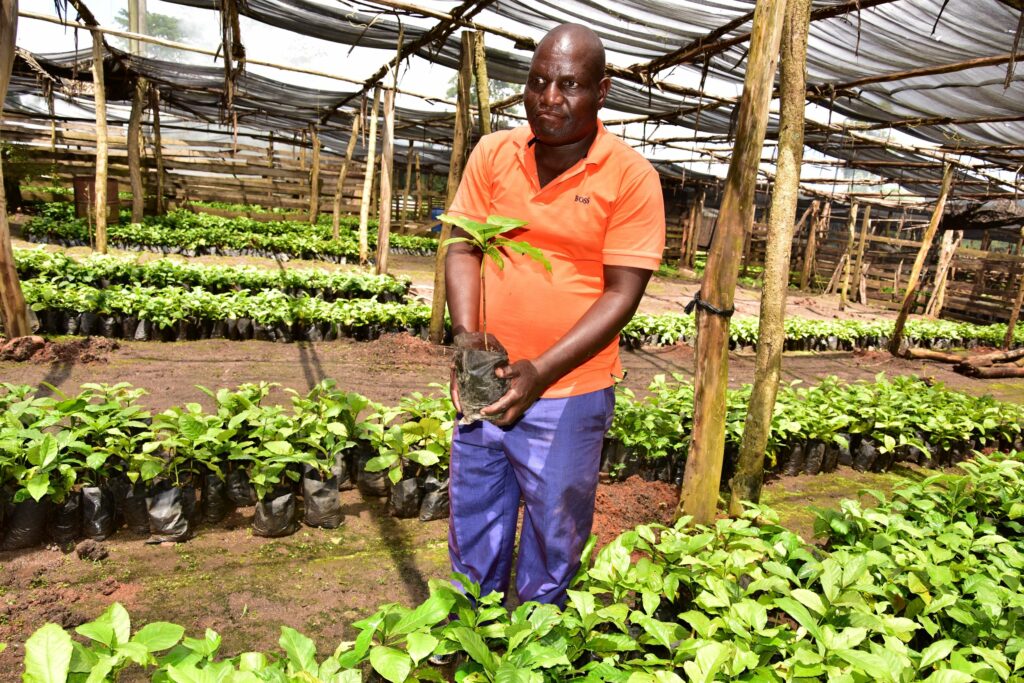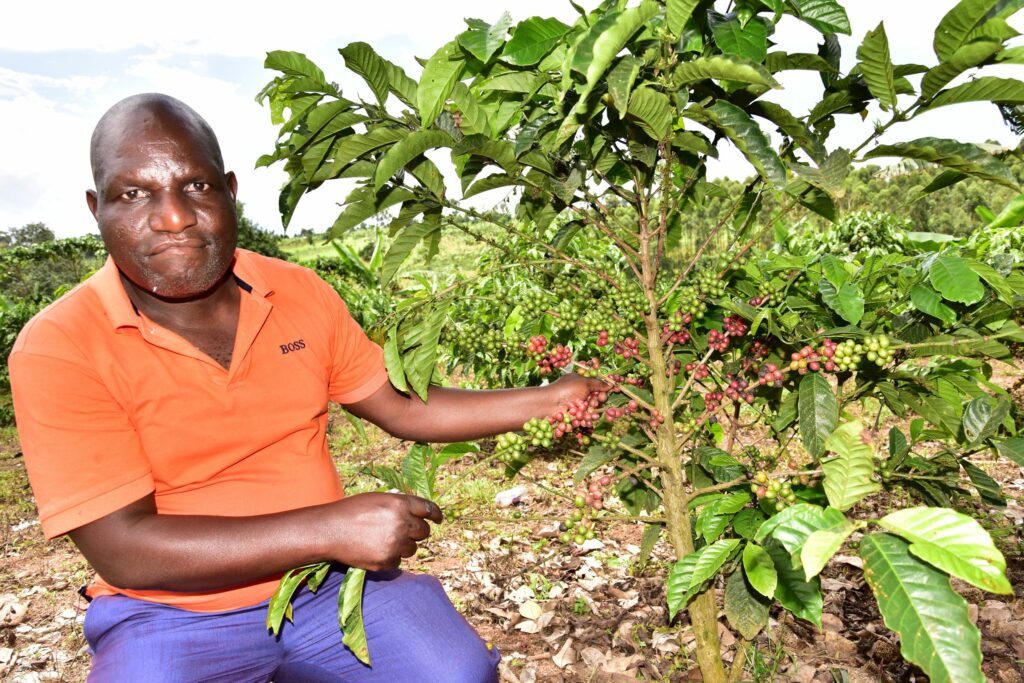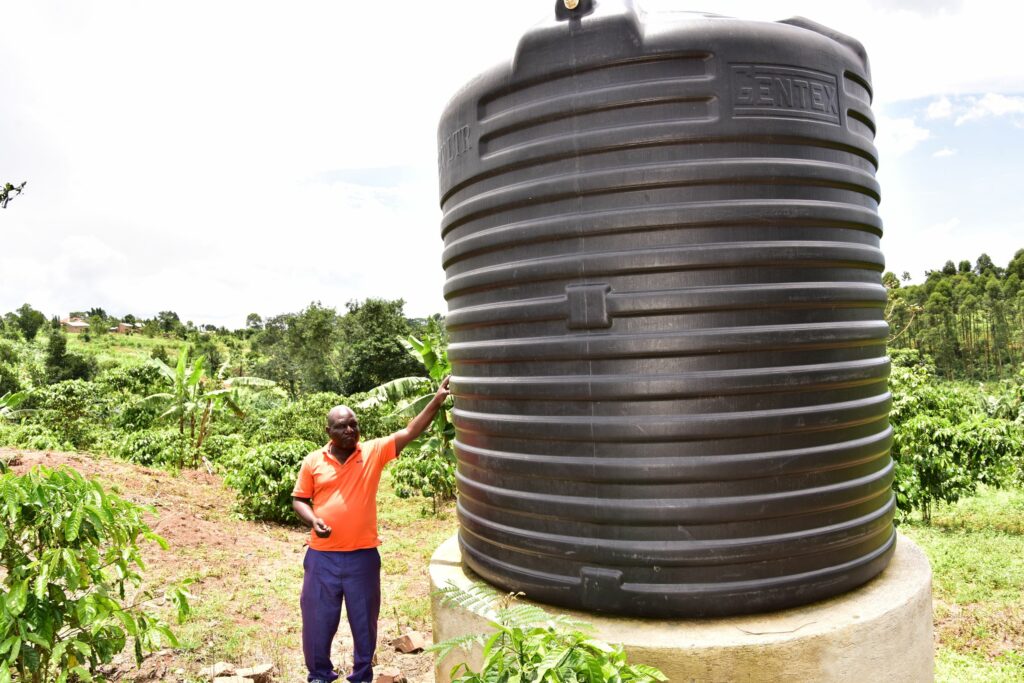By Umar Nsubuga
Yekosefati Sekabembe’s success story about commercial farming will tempt anyone to join the venture.
A visit to the 48-year-old’s farm in Kiyunga, Naluwonga parish, Mubende district is incomplete without a taste of coffee. Coffee growing is the main enterprise at his Kiyunga-based farm.
His project sits on over 25 acres of land. Much as he is a well-known farmer and best voted farmer in Mubende district in the recent greater Mubende farmers exhibition, his influence spreads across the district.
Sekabembe also owns one of the biggest coffee nursery beds in the area, it sits on half an acre and it has over 100,000 seedlings, which he sells to other farmers.
While most coffee growers use artificial herbicides and fertilisers, Sekabembe focusses on organic coffee farming.
“After my Primary Seven in 1989, there was no tuition fees to further my studies. I did not despair because I had already planned to go into farming”, Sekabmbe explains.
“I thought since agriculture played an important role in Mubende and the entire country, and it’s one of our country’s export revenues, it was the only breakthrough I could count on. And since there was a 10-arce piece of land I had bought in 2001, I decided to use it to grow coffee for a living. I have never regretted my decision, and now I own 25 acres, of which I have been expanding slowly,” Sekabembe explains.

How he started
Sekabembe started planting coffee in 2002, and he started with clonal coffee on two acres. After undergoing training for five months and acquiring experience in coffee growing, he discovered that organic farming was not only a better approach to coffee growing, but also a cheap practice as a farmer did not have to spend on pesticides and fertilisers, which could be made locally using organic materials.
He got coffee seedlings from a nearby dealer and planted them. They were 4,500 seedlings, each costing sh1,000.
“I realised there was a need to increase my coffee business by producing my own. Besides, I wanted to have coffee gardens that I would use to educate farmers on pre- and post-harvest handling, because I determined I started small”, Sekabembe says.
His coffee plantation has been a success story. He harvests between 700 and 900kg per acre that are then sold at sh4,000 kiboko and its before processed and Kase when its processed sh8,200 per kilogramme.
Averagely, he harvests 17,500kg from 25 acres, bagging sh70m each season.
He, however, notes that coffee prices are unstable between sh4,000 and sh4,500 and sh7,500 and sh8,000. He says organic farming is also a safe way to stay healthy by both the farmer and the consumer as purely organic farm materials are used, thus no side effects.
“The environment as well is safe from the damage caused by chemical sprays. Organic manure also promotes the growth of natural organisms in the soil, boosting the growth of coffee plants”, Sekabembe says.
Globally, people are increasingly becoming mindful of their health, which gives organic food high demand on both the local and international market, Sekabembe notes.
“As part of my organic farming programme, I carry out inter-cropping, where I grow coffee on the same plot of land, with fruit trees”, he says.
The trees provide timber. He also makes organic manure and pesticides out of natural materials. And, so far security at his farm is commendable. “We don’t have thieves in our area because most of the residents are farmers”, Sekabembe says.

Organic manure
The raw materials he uses are animal urine, water, red chillies, wood ash, herbs, such as marigold, phytolaca (asali), garlic and onions. Once the ingredients are mixed, they are left to ferment for 14 days and then used for spraying coffee plants to protect them from diseases and pests that destroy the leaves and beans.
Sekabembe also makes manure from animal droppings, leftover food and peelings in a compost pit, where they are left to decompose for 21 days before they are used to fertilise the coffee plantation.
Though organic farming is a demanding activity it is worth the effort since it ensures safety for the farmer, consumer and the environment, while giving high yields and proceeds.
Why grow coffee?
The Ugandan government play a major role on the coffee sector, coffee contributes to about 30% of Uganda’s foreign exchange earnings and employing more than 3.5 million people.
Globally, coffee consumption is growing at a rate of 2.5% and by 2030, the world’s demand for coffee is projected to rise to 200 million bags, up from the current 160 million bags. Africa, including Uganda, is expected to contribute the most to the increased production. Coffee consumption in Uganda is growing, although at a slow rate.
He adds that coffee does not require a lot of land and it favours intercropping. “On one acre, one can grow coffee and intercrop it with beans, matooke (bananas) and soybean.
All you need is to practise proper agronomics, and you will make money,” he said, adding that the practice also ensures food security for the farmer.
As a country, we have very little to do with the prices, even if we multiplied our production now. Therefore, people need not worry that we will produce too much,” he said. ‘Many opportunities’ Sekabembe encouraged Ugandans to love their coffee and carry out proper agricultural practices, such as mulching, weeding, stumping and pest and disease control.
“To the youth, this is your time to make money. If you cannot plant coffee, go into trading, go into cafe business, establish a nursery and sell seedlings. There are many opportunities in the coffee sector,” he urged.
Uganda has a target of increasing its coffee production from four million 60kg bags a year to 20 million bags by the year 2025.
Family involvement and labour
Sekabembe involves his family, through the distribution of labour. “Prior to the beginning of a season, we convene a pre-season planning meeting,” he says.
According to Sekabembe, preparations for the next season of the coffee estate commences in the month of January. It includes recruiting a labour force of 10 people to slash the overgrown grass.
I normally pay casual labourers sh5,000-sh10,000 per day. It takes three weeks for the work to get done. By the end of the three weeks, each labourer will have earned sh105,000.
Cost of spraying the shamba in March, the coffee plantation is sprayed. According to Sekabembe, the farm usually requires 100kg of pesticide.
Each kilogramme of pesticide goes for sh25,000, making a total of sh2,500,000. Usually, the spraying exercise requires a labour force of 10 people. Each labourer would earn sh3,000 per day.
The exercise usually lasts a week, which means each labourer will have earned sh21,000, creating a wage of sh210,000.
In April, a farmer is obliged to apply fertilisers. A bag of fertilisers costs sh90,000. Sekabembe says they use 100 bags of fertilisers, which cost a total of sh900,000.
The exercise, which lasts two weeks, would require a labour force of 10 people. Each labourer earns sh42,000. The total wage bill of 10 labourers is sh420,000.
Adding value
Sekabembe says sometimes, the yields depend on the weather conditions. After harvesting the coffee beans, they are put in a drum full of water. “All the coffee beans that sink are deemed good while the ones that float are of poor quality,” he says.
Those that float are removed, dried separately and sold at a lower price than the good ones. On the other hand, the good coffee is taken to a pulping machine, which we bought as coffee farmers, it’s where the red skin is removed.
After pulping, the coffee is dried on raised beds.
Sekabembe says most Ugandan coffee farmers have not embraced value addition. He wonders why Uganda’s ‘black gold’ is exported in its raw form. “What do those people in America do to the coffee that we cannot do here?” Sekabembe asks.
Sekabembe’s dream is to start processing coffee because all the machines came and it is going to help all farmers in the area. “We still need support from the Government. Apart from me, there are over 50 other farmers in this area, each with an average of at least one acre of coffee,” he says.
Dry spells
Although Mubende sometimes experiences prolonged dry spells, Sekabembe’s coffee plantation is not affected because he irrigates his crops using water from a reservoir he constructed. According to Sekabembe he saved sh18m to buy tanks and pipes in the garden.
He also put animal droppings in his gardens which he buys from Ayala company.
Community impact
Sekabembe says there are a number of farmers who have started growing coffee using modern methods. “When I realised that coffee is a money-maker, I encouraged people in my area to start growing it,” he says.
He says he is turning Kiyunga into a model coffee growing village. At the moment, there are eight farmers who Sekebembe is helping to set up coffee farms. “Each of these farmers has an average acre of coffee. This means that there are over 30 acres of coffee that I have inspired in this area,” Sekebembe says.
Harvest and market
Higher export prices are the first step towards securing higher incomes for farmers, Sekabembe explains. ‘Organic coffee commands higher prices on the international market, compared to conventional coffee’, he says.
For example, while a kilogramme of inorganic coffee costs sh3,500 on average, organic coffee goes for sh6,000.
“I have 11,250 coffee trees that yield 1.3kg of coffee beans, translating into 14, 625kg of coffee per season”, Sekabembe says.
As a result, he earns at least sh53m from a single season’s sales after all expenses are offset. This has enabled him to fend for his children by providing them with basic needs, such as school fees, medication, clothing and shelter.
He says, he sales his coffee to Uganda coffee farmer’s alliance, they approached him because he has good and standard coffee.
About 20% of Uganda’s population earn a living from coffee and if quality products and suitable farming infrastructure are emphasised, the crop will enable Uganda to attain middle-income status.
Achievements
Apart from paying his children’s’ tuition fees, he has set up another business, a fuel station.
“I started a crop drug shop, which helps residents not move long distances,” he says.

Challenges
Taxes frustrates, Sekabembe argues that Uganda’s economy entirely hinges itself on the agricultural sector, but the Government has not considered it as a key priority. “Almost every imported agro input, ranging from fertilisers to pesticides, is quite expensive for farmers because of the taxes heaped on them”, he complains.
“It is not easy to get trusted workers at the farm. Some of the workers are lazy and have to be ‘pushed’ before they do any work. Others are thieves,” he says.
Advice to coffee farmers
Sekabembe advises farmers to consider coffee as an important crop. There is hope for better coffee prices and market but that it is dependent on the kind of care for the coffee on and off the farm.
Success has come out of the hard work, sacrifice and conducive environment, I was encouraged by one of the progressive farmers in the area.
Voices
Emmanuel Kabanda area councillor and farmer
Sekabembe has taught us how a farmer needs to create time for his garden. He shares his knowledge free of charge. He taught me how mulching keeps water and moisture for the plant to survive in dry seasons.
Grace Mugisha a resident
I appreciate my neighbour Sekabembe because he has set for me the foundation and I am really learning from him that hard work pays.
Richard Wamala, a worker in the farm says, Sekabembe is a source of inspiration to many youths who visit the farm, “I always observe when he is teaching and indeed, I see people leaving the farm when they have developed interest in what he is doing. He is also a person who wants to share the knowledge he has to every coffee farmer in the area.





